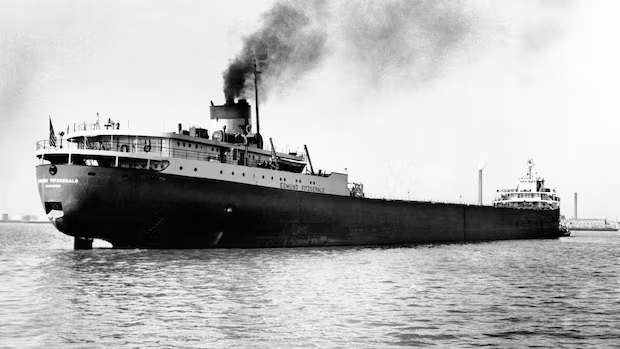50 years after sinking, the Edmund Fitzgerald lives on through internet memes

Listen to this article
Estimated 6 minutes
The audio version of this article is generated by text-to-speech, a technology based on artificial intelligence.
Fifty years ago this week, the SS Edmund Fitzgerald sank in a winter storm on Lake Superior, taking the lives of all 29 men on board. Canadians may know this story thanks to Gordon Lightfoot’s hit song about it, The Wreck of the Edmund Fitzgerald.
Half a century later, the song and the story have gained a second life as one of the most popular Instagram memes.
Today on Commotion, host Elamin Abdelmahmoud speaks with music critic Niko Stratis and writer Conor Kerr to discuss why the tragedy of the Edmund Fitzgerald remains a constant cultural fascination.
We’ve included some highlights below, edited for length and clarity. For the full discussion, listen and follow Commotion with Elamin Abdelmahmoud on your favourite podcast player.
WATCH | Today’s episode on YouTube:
Elamin: A year after that tragedy happens, Gordon Lightfoot releases his song, The Wreck of the Edmund Fitzgerald. It becomes an unexpected hit. This song goes No. 1 in Canada, it is No. 2 in the United States, the Billboard Hot 100, this song is the second song on that chart. That’s pretty bananas to me. It is one of the greatest songs of all time. It’s a song that all three of us really love. Niko, what does this song mean to you?
Niko: There’s a lot of parts of it that I love. It’s a beautiful song. The storytelling in song craft is incredible. But a thing I’ve always really loved about it is [that] it is a song about class. It’s not about class, but it’s about class. I grew up in a working class family, I’m a third generation trades worker, my dad is in his 70s and still works in the trade that he did, that I did, that my grandfather did. We live lives that people don’t often memorialize like this, they don’t honour like this. And not in a way that’s patronizing, it’s imagining that people like us could live lives that are worth these beautiful moments.
It’s also a murder ballad where God pulls the trigger. And so often, when it’s boat crashes, it is the folly of wealth or the folly of man. And this is just men that are out there, that are working, that are doing things that people would often look past or down on are worthy of the esteem of this beautiful, dirge-y song that makes their lives incredible and eternal.
Elamin: The song begins with [Lightfoot] being like, “Hang on before we even get to the story there, the way that people talk about Lake Superior is much older than the thing that I’m about to tell you.” So he quotes the Chippewa, and he’s saying [that] the Chippewa are familiar with the winds on this lake. And there’s a deep, long history to the way that these gales can surprise people. And I think that’s the part that sticks out to me, Conor, is this idea Gordon Lightfoot is trying to say [is]: “Those people on that boat, they should have known because actually there’s a really lengthy history of the way that these winds have been talked about.” Does that stick out to you as well?
WATCH | The official audio of the Wreck of the Edmund Fitzgerald:
Conor: I think that’s where you [get] the land acknowledgement aspect of that. But it also ends with that too. And that’s where it comes right back in at the very ending. And “they said” — “they” being the local Indigenous peoples of the area — are the ones that are actually saying that the lake never gives up their dead. They’re never going to come back and find that element that exists there. And I think that’s just such a way of honouring, once again, the First Nations’ local knowledge of the lake. This is a dangerous thing. As much as you think with your technology that you can conquer this, it’s not happening. There’s another force behind it here too.
Elamin: There is life to the song — 49 years after it comes out, 50 years after the sinking. One of the reasons we’re gathered today is to talk about the fact that there’s a whole subset of the internet — all three of us are a part of this subset of the internet — of just seeing and receiving a lot of Edmund Fitzgerald memes, a lot of commentary. Like, “Oh, men don’t want to go to the club, they just want to think about the Edmund Fitzgerald.” What makes a song meme fodder? Why do you think that’s happening?
Niko: Look, if scientists could harness this energy, we could do anything. I don’t know, I kind of wish I knew. Because I wish I knew why my DMs suddenly have exploded in the last year with everybody I know and people I don’t know sending me Edmund Fitzgerald memes.
But it’s very yearning in its way. It’s like a Springsteen song almost. There’s a bit of queerness to it because it’s a little bit queer to yearn this much for the water…. It’s very campy and it’s very playful. And I think it is this sincerity that’s presented as ironic, but it is deeply sincere. And it is perfect meme fodder because it’s a series of incredible lines that if you use them out of context — like in a video of somebody driving away from somebody in a car — you’re like, “Yeah, I get it, man.” Put any line of this in front of a McDonald’s bag floating in the wind, and you’re like, tears are coming.
You can listen to the full discussion from today’s show on CBC Listen or on our podcast, Commotion with Elamin Abdelmahmoud, available wherever you get your podcasts.
Panel produced by Simi Bassi.





